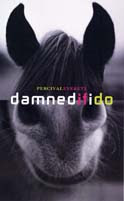>
As noted in an earlier post (“Reading on the Road”), I really enjoyed Percival Everett’s Damned if I Do, a story collection published in 2004 by Graywolf. Everett, whom I’ve enjoyed speaking to at Bread Loaf the past two years, is a terrific writer and, by all accounts, a good guy. (I attended a seminar he presented in 2006—something about bullshit—and it was predictably funny and offbeat and a little weird, like Everett’s writing. This story collection is thoroughly impressive.
My favorite story, although there are many excellent pieces here, is “The Appropriation of Cultures,” in which Daniel, a young black man who, among other things, plays in a jazz band. One night he is in a club and some drunk college kids want him to play “Dixie.” He hesitates.
“And then he started to play. He felt his way slowly through the chords of the song once and listened to the deadened hush as it fell over the room. He used the slide to squeeze out the melody of the song he had grown up hating, the song the whites had always pulled out to remind themselves and those other people just where they were. Daniel sang the song. He sang it slowly. He sang it, feeling the lyrics, deciding that the lyrics were his, deciding that the song was his. Old times there are not forgotten . . . He sang the song and listened to the silence around him. He resisted the urge to let satire ring through his voice. He meant what he sang. Look away, look away, look away, Dixieland.”
This fantastic story also won a Pushcart Prize in 1998.
Although race is obviously an important element in that story, elsewhere it runs below the surface, part of the environment that supports the conflict, but exactly an element of the conflict itself. In “Afraid of the Dark,” Austin is asked to help pick up a horse from Pueblo and bring it back, along with an old drunk. They locate the drunk in a bar:
“He looked at his empty glass. ‘Well, okay.’ And he stood up. He was nearly seven feet tall. Austin felt the front of his neck stretch. ‘But I gotta hit your buddy.’
‘What?’ Dwight asked.
‘I’m gonna hit your pal here.’
‘Why? He didn’t say a word.’
‘Yeah, but that’s what bothers me.’ He swayed a bit with the alchohol. He looked at Austin as if for the first time. ‘Hey, you’re black.’
‘I know.’ Austin studied his balled-up fist. ‘I would prefer if you didn’t hit me.’”
I’m definitely going to be reading more of Everett’s work.

>I can’t wait to read this collection.